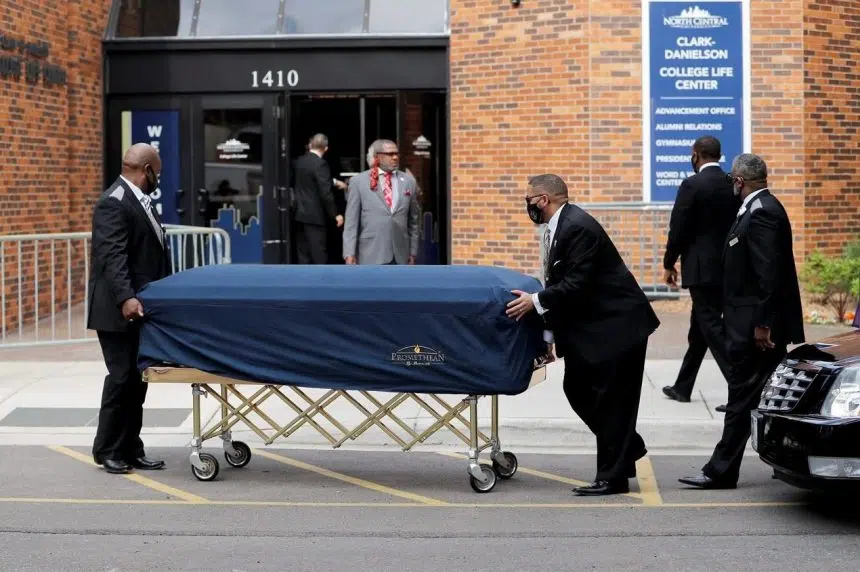MINNEAPOLIS — Mourners converged in Minneapolis on Thursday for the first in a series of a memorials to George Floyd, whose death at the hands of police has sparked turbulent protests around the world against racial injustice.
The afternoon event was set for North Central University, where the civil rights leader the Rev. Al Sharpton was scheduled to be among those eulogizing the 46-year-old Floyd.
“He was a human being. He had family, he had dreams, he had hopes. The real duty of one with this type of assignment is to underscore the value of the human life that was taken, which gives the reason the movement was occurring,” Sharpton said ahead of the gathering.
Inside the sanctuary, a golden casket was flanked by white and purple flowers, and an image was projected above the pulpit of a mural painted at the street corner where Floyd was pinned to the ground by police. The sanctuary normally seats 1,000, but because of the coronavirus outbreak, the capacity was reduced to about 500.
The service was expected to attract an array of celebrities, civil rights leaders, activists and politicians from around the country.
Seats were reserved for actors and comedians Kevin Hart, Tiffany Haddish and Regina Hall; actor and producer Tyler Perry; Martin Luther King III; the Rev. Jesse Jackson; Minnesota Gov. Tim Walz; Minneapolis Mayor Jacob Frey; Rep. Ilhan Omar; Sen. Amy Klobuchar and others, though it wasn’t certain that all would attend.
Memorials are set to take place in three cities over six days: After the Minneapolis event, Floyd’s body will go to Raeford, North Carolina, where he was born, for a public viewing and private family service on Saturday.
Next, a public viewing will be held Monday in Houston, where he was raised and lived most of his life. Then a 500-person service will take place Tuesday at the Fountain of Praise church.
The farewells for Floyd — an out-of-work bouncer who was arrested on suspicion of passing a counterfeit $20 bill at a convenience store and died after a white officer pressed his knee on the handcuffed black man’s neck for several minutes — come as demonstrations around the globe continue.
In the U.S., where protests had been marked by bouts of lawlessness earlier in the week, relative quiet continued for a second straight night Wednesday following a decision by prosecutors to charge the three other Minneapolis officers at the scene of Floyd’s death with aiding and abetting a murder.
Authorities also filed a new, more serious murder charge — second-degree, up from third-degree — against the officer at the center of the case, Derek Chauvin.
If convicted, they could get 40 years in prison.
The three officers newly charged in the Floyd’s death — Thomas Lane, J. Kueng and Tou Thao — were due to make a first court appearance Thursday. Chauvin is not due in court until Monday.
Meantime, in Georgia, a white father and son charged in another killing of a black man that has raised racial tensions in the U.S. made a court appearance Thursday via video. A state investigator testified that the man accused of shooting Ahmaud Arbery, Travis McMichael, uttered a racist epithet as he stood over Arbery’s body.
The new charges in Minneapolis punctuated an unprecedented week in recent American history, in which largely peaceful protests took place in communities of all sizes but were rocked by bursts of violence, including deadly attacks on officers, theft, vandalism and arson. In Minneapolis alone, more than 220 buildings were damaged or burned, with damage topping $55 million, city officials said.
Nationwide, more than 10,000 people have been arrested, an Associated Press tally found. More than a dozen deaths have been reported, though the circumstances in many cases are still being sorted out.
From Paris and London to Tel Aviv, Sydney, Johannesburg and Rio de Janeiro, Floyd’s death has triggered demonstrations, with protesters decrying inequality, police brutality and other problems in their own countries.
“It’s a solidarity question. We stand with our brothers, internationally, our sisters as well, but the same thing is happening here. It’s no different,” Isaak Kabenge said in Stockholm.
The attorney for Floyd’s family, Ben Crump, called the additional charges against the officers “a bittersweet moment” and “a significant step forward on the road to justice.”
Hundreds of protesters were in New York City’s Washington Square Park when the charges were announced.
“It’s not enough,” protester Jonathan Roldan said, insisting all four officers should have been charged from the start. “Right now, we’re still marching because it’s not enough that they got arrested. There needs to be systematic change.”
The mood in New York turned somber later in the day after a police officer on an anti-looting patrol was ambushed by a man who walked up behind him and stabbed him in the neck. Two other officers suffered gunshot wounds to their hands in the struggle, and the attacker was in critical condition after being shot by police.
The new second-degree murder charge alleges Chauvin caused Floyd’s death without intent while committing another felony, namely assault. It carries a heavier sentence than the third-degree charge, which is punishable by up to 25 years behind bars.
At a protest in the nation’s capital, 30-year-old Jade Jones said the demonstrations would continue despite the new charges.
“That’s the least they could do,” Jones said. “It’s not going to wipe away 400 years of pain.”
Aaron Morrison, Nomaan Merchant and Matt Sedensky, The Associated Press







